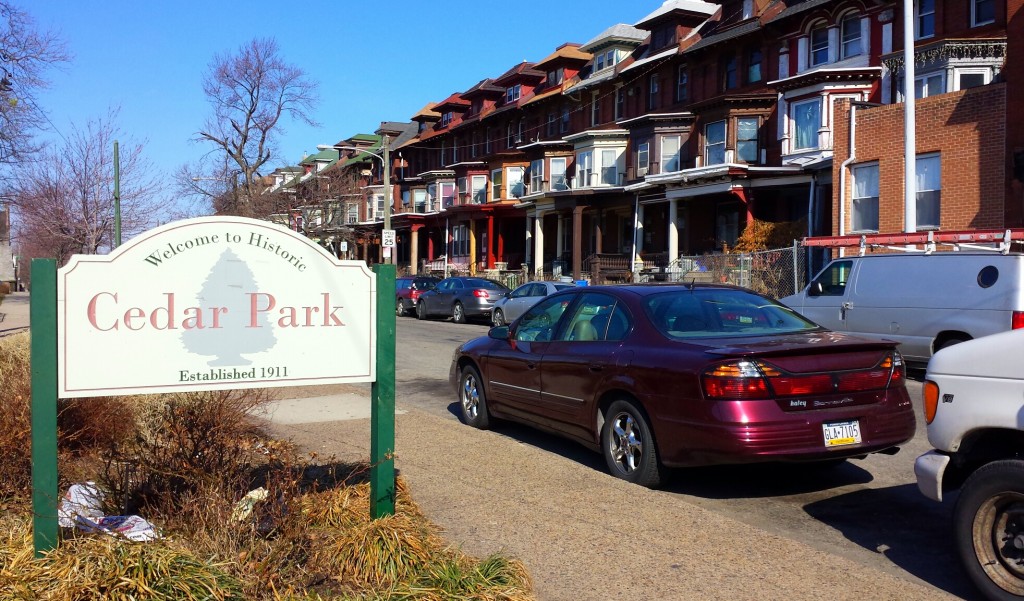Over the past 10 years, West Philly has undergone a semi-orchestrated revival, with the last five of those years seeing rapid — and, in some areas, dramatic — change. New businesses started popping up along the Baltimore Ave Corridor while young professionals and grad students began moving out further and further from the confines of 40th Street.
And, as with any other metropolis experiencing accelerated regrowth, West Philly has also seen an increase in housing and rental prices throughout those years. But nothing as dramatic as the spike in monthly rents that’s happened in the Cedar Park area over the last year: an 18 percent jump from 2013 to 2014.
As Technical.ly Philly reported last week, rental listings from the San-Francisco-based rental service Lovely showed that, in Southwest Cedar Park, the monthly median rent price went from $900 in January 2013 to the current $1,100 medium—the highest increase among neighborhoods in Philadelphia.
“It is troubling that the rents went up that high. I’m surprised to see that it went that high,” Michael Froehlich, president of the Cedar Park Neighbors association, told West Philly Local. Although he knew the rents were rising in the area, he said, he didn’t think they were “the highest” in the city.
According to Lovely’s rental listings, a 700-sq ft. one-bedroom apartment at 48th Street and Baltimore Avenue is now available for $1,250 a month, while a 400 sq. ft. studio at 46th Street and Cedar Avenue is available for $750. There are also one-bedroom apartments in the $700 to $1,050 range, but those are scattered across the area.
A possible reason for the rent hike, said Froehlich, is the reassessment of property values in the area under the city’s new Actual Value Initiative (AVI), which went in effect this year. Due to the AVI, many homes in West Philadelphia have seen a sharp climb in property taxes, some of which doubled or tripled. While there are many city programs—like the Longtime Owner Occupants Program—to help homeowners deal with their increased tax bill, Froehlich suggested that it may be worth it to the City of Philadelphia to examine how the reassessment affected renters in the region, who may have experienced a rent increase because their landlords are trying to shift the cost.
“I think there’s something to that,” he said, making note of Council President Darrell Clarke’s plan to build 1,500 affordable units on city-owned land in gentrifying neighborhoods as a way to examine Philadelphia’s role in subsidizing below-market units. “It’s an idea worth investigating.”
To that end, Froehlich said Cedar Par k Neighbors is deeply concerned about the availability of affordable housing in the area, and how to prevent the displacement of long-time residents due the shrinkage of such units. Particularly, he stressed, the community association is focused on ensuring Cedar Park’s seniors can continue to thrive in the area they’ve called home for decades, and finding ways to help them offset rising housing costs so they can “age in place.”
“There’s a lot of attention about all the change in Cedar Park over the last five, 10 years, but the fact is people have been living, working and involved in Cedar Park for 50, for 60 years,” he said. “Cedar Park Neighbors would be failing in its mission if, as a result of this rapid redevelopment, neighbors who have lived here for years could no longer afford to live here because of the living costs.”
After Cedar Park, the second highest surge, 16 percent, happened in Avenue of the Arts South area, which saw a median price jump from $1,550 to $1,835, Lovely’s data shows. Logan Square experienced the sharpest decrease, 11 percent, with median rents falling from $2,135 to $1,923—but, as a reader noted in our comments, University City wasn’t far behind, seeing a 10 percent decrease, with median rents falling from $1,595 to $1,450.
–Annamarya Scaccia






March 28th, 2014 at 12:33 pm
This is so interesting, thank you! That Google document reports that “University City” is down by 10%, to contrast– so I wonder whether we’re just seeing high-income renters percolating west.
March 28th, 2014 at 7:27 pm
Great article! Thank you!
March 28th, 2014 at 11:21 pm
I think the sample is biased. It is rentals that are listed on their website, not a random sample. It could mean that their website is becoming more popular with a lower-middle income demographic and that they’re getting slightly closer to real median rents.
They’ve got a median rent of $1225, but the American Community Survey says $666 in 2009.
http://www.city-data.com/county/Philadelphia_County-PA.html
We probably won’t have the best proof of the impact of the AVI on renters until the ACS releases its results for 2014 (this could take until 2016). That should give a good data set of rental costs by census tract.
March 28th, 2014 at 11:36 pm
Renters will pay on average $200/year more than homeowners and this is true of every income group:
http://www.campusactivism.org/blog/node/396
March 29th, 2014 at 7:17 am
I live at 49th & Walton and our landlords had to raise our rent by $150/mo to cover the sharp property tax increase due to the reassessment. Luckily for me it coincided with a raise at work so I’m able to stay in the house I’ve been living in for 7 years…but if not for that I would have been forced to move to someplace more affordable.
March 30th, 2014 at 1:18 am
I know landlords in other University City neighborhoods have been jacking up rents to deal with AVI. It was inevitable. AVI increases hit particularly hard on the western edge of UC (I checked the results by block).
Froehlich & CPN are in somewhat of a bind. Naturally no one wants to find themselves squeezed out of a pleasant neighborhood by rising costs. But everyone also likes a neighborhood that is pretty, fun, convenient & safe. I always thought Cedar Park was undervalued! Maybe the rest of the world is catching on….
More realistically, CPN should encourage new market-rate residential construction on the neighborhood’s vacant lots. “Affordable housing” is not an adequate answer to price hikes. Simply increasing the overall housing supply will rein prices in.
March 30th, 2014 at 4:30 pm
“Affordable housing” is not an adequate answer to price hikes. Simply increasing the overall housing supply will rein prices in”.
tony, by that logic, Manhattan and Taipei would be very affordable places to live. Even with the construction boom of the early 2000s, median rental prices have continued to soar beyond typical income levels in most urban areas, particularly in cities where a lot of new construction is taking place. “More housing equals lower prices” may theoretically make sense, but it doesn’t seem to match the reality of contemporary real estate dynamics, although it is a sentiment voiced commonly by developers and real estate private interest groups.
March 30th, 2014 at 11:24 pm
Obviously you want to increase housing supply faster than demand. While this shouldn’t be too hard to meet the demand for the entire city – it is hard to meet the demand in certain neighborhoods.
Also you may want to increase the housing supply in a way that doesn’t increase demand. For instance, it is possible that increasing supply for certain groups of people (possibly entrepreneurs and some types of college graduates) could increase demand MORE than the number of units you built – leaving you with a net decline in housing availability.
Side note: I’m estimating 10-15% of the cost of a rental property in West Philly is due to property tax. So a 50% increase in property tax should lead to a 5-7.5% increase in rent.
April 4th, 2014 at 6:51 pm
Has it occurred to anyone that a 15-person start-up operating out of a shared office space in San Francisco, and whose main product is a rental app for iPhones, might not be the best source of accurate real estate statistics for Philadelphia neighborhoods? I suspect no one at “Lovely” has ever set foot in Philadelphia, much less Cedar Park. Anyone interested in trends in housing/rental costs would be better off consulting local renters, realtors and landlords.
August 5th, 2014 at 3:27 am
I’m in the belief that gentrification ruins neighborhoods, cultures, and entire cites. I’m a 23 year old white woman that been on her own since 17. Race is not the issue. All I’m ask is please…
…stay within your means!!! If you have XXXX or XXXXXX amount of college fund don’t try to venture out into the “ghetto” areas because you feel you understand poor culture and can make a difference or make it and/or save money. All you do is push lower income people out of there affordable neighborhoods into worse off neighborhoods that don’t accommodate their needs. We have gardens, we don’t need you. We have vegan restaurants, we don’t need you. We have coffee shops, we don’t need you. We have our own community, we don’t need you. We have our own bike laws, we don’t need you. Get over it!!
August 5th, 2014 at 2:57 pm
Gentrifier complains about gentrification.
August 5th, 2014 at 3:38 pm
Seriously. Not sure if she knows what gentrification means.
August 5th, 2014 at 3:51 pm
Families looking to sell grandma’s house in Cedar Park to pay for her nursing/end-of-life care take note:
A woman *seven whole years* out of her parents’ house says you shouldn’t sell it to whomever you can for as much as you can. Grandma is going to have to make do with whatever this young lady believes is an appropriately discounted price to ward off gentrification. Yep.
August 7th, 2014 at 11:46 am
I agree with others who question the reliability of these statistics, though I’m glad this is being discussed.
I had spent a few months following the rental market a little over a year ago, and now have again been researching the market (Craigslist, Padmapper, and word-of-mouth). What I noticed in early summer was that average rents had increased a lot since a year previous. I lamented to my husband that we may have waited too long to move to Cedar Park. But I question whether the market supported such a drastic change. Because a month later, average prices seemed to settle back down closer to where they had been a year previous. Higher, certainly, but representing more normal yearly increases. Previously advertised 1 bedrooms for $800 were now at $850, rather than $1000. Several apartment ads included the words “rent just reduced!” So I think this is part AVI, but part landlords looking around at what their neighbors were charging and wanting to be on that bandwagon. And then readjusting for the market once they realized there are only so many moneyed professionals trying to move here at once.
That’s just one person’s impression, though.
August 7th, 2014 at 1:43 pm
I found a reliable data source – the American Community Survey. For the 2000 to 2010 period, rent increased by an average of 4.5% each year in the 19143 zip code. By contrast inflation was 2.3%.